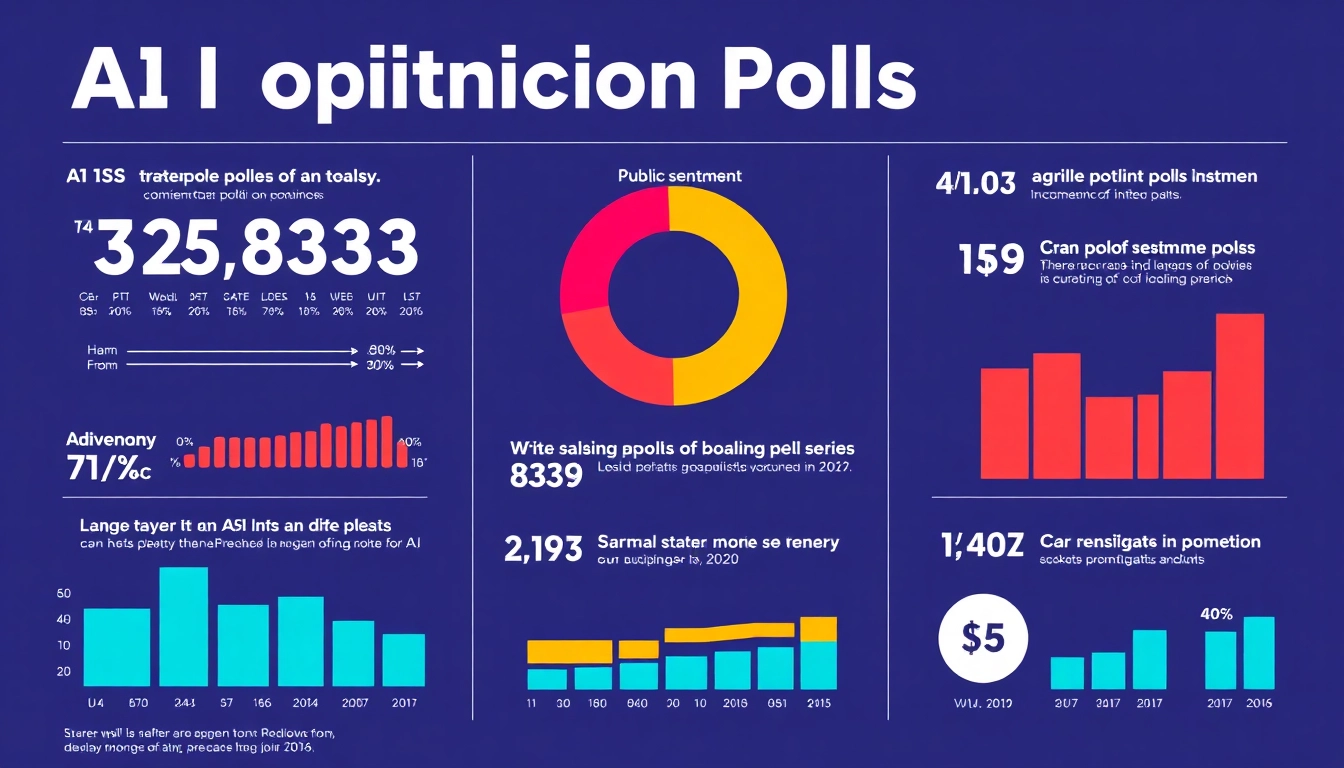
Introduction to AI Opinion Polls
In the rapidly evolving landscape of artificial intelligence (AI), public perception plays a crucial role in shaping policies, business strategies, and even the technological advancements that companies pursue. AI Opinion poll serves as a vital tool for understanding societal attitudes towards AI applications. These polls gather data on how the general population views AI technologies, addressing both excitement and concerns, which can significantly influence the direction of AI development.
What Are AI Opinion Polls?
AI opinion polls are surveys designed to capture the sentiments, beliefs, and perceptions of the public regarding artificial intelligence. These polls utilize various methodologies, including online questionnaires, face-to-face interviews, and social media analytics, to gather insights from a diverse array of demographics. By analyzing responses, organizations can gain a comprehensive overview of public sentiment, which is vital for various stakeholders—including policymakers, businesses, and AI developers—to tailor strategies that align with societal views and concerns.
Importance of Public Sentiment in AI Development
The significance of public sentiment in AI development cannot be overstated. Understanding how society perceives AI can guide ethical considerations, regulatory measures, and even funding allocations for AI projects. For instance, if a large segment of the population expresses skepticism about AI’s potential for job displacement, companies might prioritize transparency in their AI implementations. Moreover, public opinion can be a double-edged sword; while positive sentiment can drive innovation, negative perceptions can lead to backlash against technologies perceived as harmful or invasive.
Recent Trends and Findings
Recent opinion polls, such as those conducted by Pew Research, highlight a growing concern among Americans regarding the implications of AI in their daily lives. A survey conducted in November 2023 revealed that 52% of Americans are more concerned than excited about the impact of AI. This sentiment was echoed in a Gallup report where respondents discussed job security and AI’s potential to exacerbate socio-economic disparities. As AI continues to permeate different facets of life—from healthcare to finance—grasping public sentiment through polls ensures that AI evolves in a direction that meets societal expectations.
Analyzing Public Concerns about AI
As AI technologies become more prevalent, understanding public concerns is essential for fostering trust and acceptance. This section delves into the skepticism surrounding AI and examines the roots of these apprehensions.
Common Fears and Misconceptions
Among the most prevalent fears associated with AI are job displacement, invasion of privacy, and the ethical implications of decision-making by machines. The idea that AI will replace human jobs is widespread, compounded by narratives in the media that emphasize the disruptive nature of automation. Additionally, fears about data misuse have emerged, particularly with the advent of AI-driven surveillance technologies. Misconceptions about the capabilities of AI—such as the belief that AI possesses human-like understanding or emotions—also contribute to public concerns, revealing a disconnect between reality and popular belief.
The Impact of Media on Public Opinion
The media plays a pivotal role in shaping public perceptions of AI. Sensationalist headlines often highlight extreme cases of AI misuse or failure, thereby fueling fear. A study by YouGov found that a significant portion of the American population associates AI with negative outcomes, such as the proliferation of misinformation and privacy encroachments. This media framing can lead to a cycle of negativity that impacts how AI technologies are received in various sectors. Correcting misrepresented narratives through informed journalism can be instrumental in alleviating public concerns.
Survey Data on AI Perceptions
Survey data indicate a complex landscape of opinions regarding AI. For instance, a recent YouGov poll found that while 68% of individuals believe they use AI at work, many also express concerns about its ethical implications. This paradox—acknowledging the benefits of AI while fearing its consequences—suggests that educational initiatives would be beneficial. Highlighting positive applications of AI that improve daily life could help alleviate some of the concerns while reinforcing the need for ethical frameworks and accountability in AI development.
The Role of AI Opinion Polls in Decision Making
AI opinion polls serve as a roadmap for stakeholders looking to navigate the uncertain terrain of artificial intelligence. By tapping into public sentiment, these polls can inform policy decisions and industry responses.
Influencing Policy with Public Data
Data from AI opinion polls can guide policymakers in crafting regulations that reflect public sentiments. For instance, when a significant number of respondents express fear regarding job loss due to AI, this data can prompt lawmakers to develop supportive measures, such as retraining programs or legislation that promotes responsible AI use. The potential for policy influence is further amplified when these surveys are conducted regularly, allowing for tracking changes in public sentiment over time and enabling responsive governance.
AI Developers and Industry Responses
AI developers can utilize insights from opinion polls to shape product development and marketing strategies. For example, if surveys indicate skepticism about data privacy related to AI systems, developers could prioritize features that enhance transparency and control for users. Industry leaders can leverage this data not only to build consumer trust but also to foster an organizational culture that prioritizes ethical considerations in AI deployment, potentially setting their companies apart in a crowded marketplace.
Case Studies: Successful Adaptations
Several organizations have successfully adapted their strategies based on public sentiment data. For example, a tech company surveyed its customers about their fears regarding AI in customer service applications. Based on the feedback, the company implemented more robust privacy protocols and trained AI to escalate sensitive issues to human agents. This approach not only alleviated customer concerns but also enhanced user satisfaction, showcasing the power of integrating public sentiment into business practices.
Future of AI Opinion Polling
The landscape of AI is constantly changing, and so is the approach to gauging public opinion. Innovations in polling methodologies are likely to enhance understanding and engagement with diverse populations.
Technological Advancements in Polling
The future of AI opinion polling is poised for transformation through technology. Advances in AI and big data analytics enable more nuanced understanding of public sentiment. For instance, sentiment analysis tools can process vast amounts of data from social media platforms in real-time, providing insights that traditional polling methods cannot achieve. With these technological advancements, organizations can adapt their strategies rapidly in response to shifting public perceptions.
Engaging Diverse Populations
Engagement with diverse populations is crucial for obtaining a well-rounded perspective on AI opinion. Polling methods must evolve to reach underrepresented groups, including minorities and marginalized communities. Innovative outreach efforts, such as mobile surveys or community-based focus groups, can help ensure that voices from all segments of society are heard. Additionally, multilingual surveys can help bridge language barriers that often impede participation.
Predicting Future Trends
AI opinion polls are not just tools for understanding current sentiment; they can also serve as indicators for future trends. By analyzing historical data and identifying patterns, researchers can forecast potential public reactions to upcoming AI technologies. This predictive capability is particularly useful as AI continues to evolve and expand into new areas, offering stakeholders important foresight for strategic planning and risk management.
Conclusion: The Need for Ongoing Research
The dynamics of public opinion on AI are complex and ever-evolving. Continuous research in this field is essential to navigate these changes and address the varied concerns surrounding artificial intelligence.
Summarizing Key Insights
Public sentiment regarding AI reflects a balancing act between recognizing its benefits and addressing legitimate concerns about privacy, job security, and ethical implications. Opinion polls provide essential insights that can guide stakeholders to make informed decisions that align with societal values and responsibilities.
Encouraging Continued Dialogue
Fostering an environment of open dialogue between AI developers, policymakers, and the public is vital for building trust. Engaging discussions can demystify AI technologies and address fears directly, promoting a collaborative approach to responsible AI development.
Call to Action for Stakeholders
As we look to the future, it is imperative for stakeholders to prioritize ongoing research in AI opinion polling. By investing in understanding public sentiment, we can harness the power of AI responsibly, driving innovation while remaining attuned to the needs and expectations of society. The road ahead is one of collaboration, understanding, and beneficial technological advancement, guided by the insights drawn from the voices of the public.








